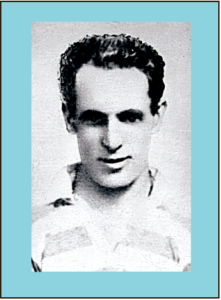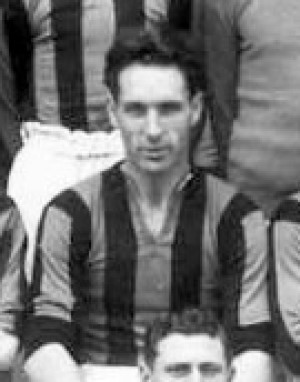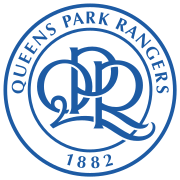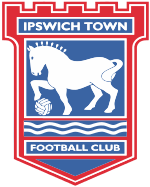By Gavan Bergin

Mick O’Brien played for years in the lower leagues of English football before he made it to the Football League. He joined Third Division Queen’s Park Rangers, in May 1920. Within a year of that, he was playing international football for Ireland.
He made his Ireland debut in the British Championship game against Scotland in Belfast on February 26th 1921.He did well that day, but they lost, 0-2. That was their third straight defeat and there were more bad days to come. In Mick’s first four years as an international player, he never once finished on the winning side. Eventually things did get better for him and the Irish team.
On April 18th 1925, in Ireland’s Championship game against Wales at Wrexham Mick gave his best performance to date. He was a titan in the backline, leading a perfectly stubborn defence that earned a 0-0 draw for Ireland. That result ended their run of four consecutive defeats. The Cardiff Western Mail said: “Mick O’Brien was the dominating figure in defence. The Wales forwards found him impassable.”
Up till then Mick had played purely as a defender for Ireland. He was a stopper and a destroyer- and he was excellent at that job. In club football he had regularly played in midfield, starting attacks and creating chances with his skillful passing, and eventually he began to utilise this creativity in international football too.
After his fine showing in Wrexham, Mick was selected for Ireland’s game against England in October 1925. But he missed out due to injury and he had to wait almost a year for his next international appearance.

On February 13th 1926 he returned to play for Ireland against Wales at Windsor Park in Belfast. And he made a grand comeback, playing even better than last time he faced the Welsh. He “got Ireland on the move in attack”, said the Independent, by sending long accurate passes out to the wingers. They scored in the 10th minute. Having shown his ability at playmaking from defence, he began to get forward to join in the Irish attacks, passing and crossing and running into the box. He made a few good chances for his strikers and he came within a whisker of scoring when he got to an Irish corner kick and fired a bullet header that was destined for the net until, somehow, the Welsh keeper kept it out. The Welsh were rattled by that close call, and Ireland scored from their very next attack. They were 2-0 ahead at half time.
Wales could have thrown in the towel. At that stage, away from home and two goals down, they might have been broken and beaten. But they had the spirit and the talent to play, with 45 minutes remaining so they had enough time to recover. They made a good fist of it. At the start of the second half, they launched a series of dangerous attacks but they were all smothered by impeccable defending from Mick and the rest of the Irish backline. By the midway point of the second half, the visitors’ threat was nullified and when Ireland scored again, Wales were finished. The final whistle sounded and Ireland had won, 3-0. At last, after five years, Mick had won a game with Ireland! And he had certainly earned the victory: the Portadown Times: “O’Brien played a sterling game. He shaped well, upset attack and deprived the Welsh forwards of the ball.”
By the time that game was played, Irish football had split, and now there were two Ireland teams. Mick played once more for the northern Irish side, then he switched to the Republic of Ireland. He made his debut for the Republic, playing in midfield against Italy at Lansdowne Road on April 27th 1927. Although he couldn’t stop the Italians winning, he was one of Ireland’s best players, the Evening Herald said: “O’Brien was masterly, joining the attacking movements and slinging fine passes, he also shot just wide from a free.”
Mick’s experience was valued as much as his ability by the Republic. Even though he was playing in the Third Division, he was still one of the best Irish defenders around and he was well known as a fine leader. In his third appearance for the Republic, he was made team captain for the game against Belgium in Brussels on May 11th 1930. He led the team back from a goal down to win 3-1.
By that time he was 37, and his playing days were nearly at an end, but when the Republic went two years without a win, they called on him again. On May 8th 1932, against Holland in Amsterdam he played one last game for Ireland, running the show as captain and midfielder and leading his team to a 2-0 win. The Irish Independent: “Mick O ‘Brien, especially distinguished himself.” And, with that he was gone. He retired from playing a year later.

In May 1933, Mick became manager of Queens Park Rangers. The season before he took over at QPR they had finished sixteenth in the Third Division. In his first season in charge, they finished fourth and they were a good bet to do even better the next year.

From QPR, he went to another of his old clubs, Brentford, where he spent a few months as assistant manager. Then, in May 1936, he was appointed as the first ever manager of Ipswich Town. Under his management, Ipswich won the Southern League in ‘36/’37. That was their first trophy as a professional club. He managed Ipswich to 25 wins and 9 draws from 39 games. His next job was in the League of Ireland, when he took over Cork City in 1939. He didn’t stay there for long. He went back to England and worked as a coach for the Middlesex FA.
Mick died on September 21st 1940. His life was short but he lived it fully, on and off the football field. During the Great War, he served as Ordinary Seaman in HMS Chester at the Battle of Jutland, and was awarded the War and Victory medals for his service.
End of the Mick O’Brien story.
Read more:
Mick O’Brien – Part 1
Mick O’Brien – Part 2
Mick O’Brien – Part 3



